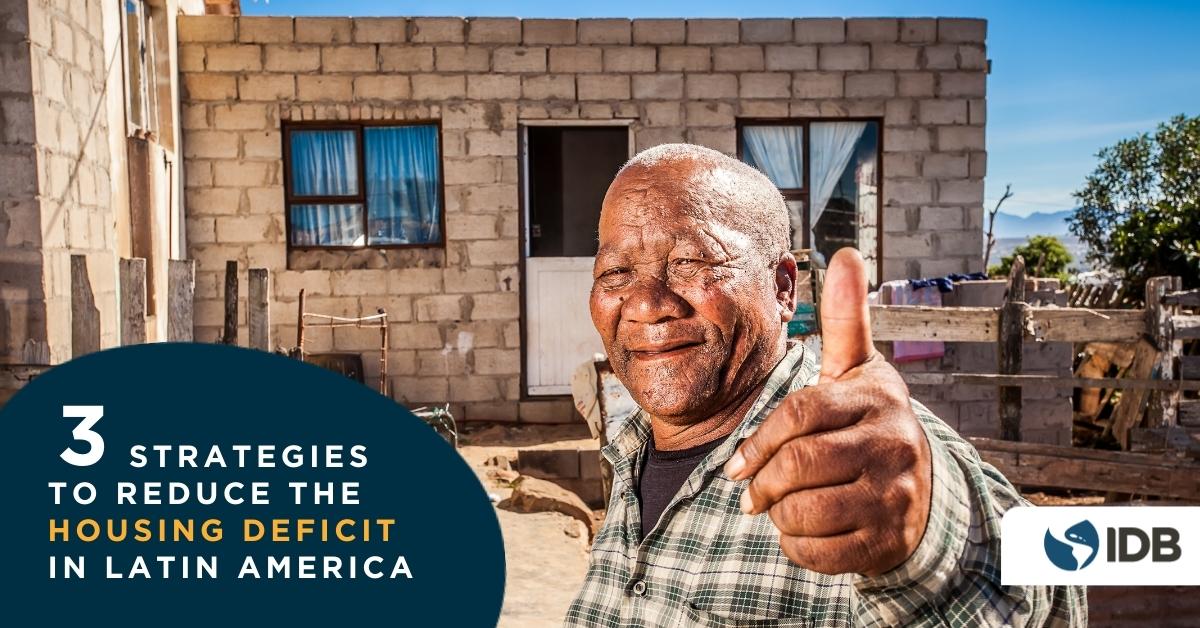Este artículo está también disponible en / This post is also available in: Spanish
Housing plays a much more important role than is generally recognized. Not only does it satisfy people’s basic needs for well-being, protection, safety and health, but it is also the main pillar for overcoming poverty.
In Latin America and the Caribbean (LAC), 33.7% of the population lives in poverty. If we add to this the fact that almost half of the region’s inhabitants do not have access to decent housing, we find ourselves in an emergency situation that must be addressed. But what strategies can be used to reduce the housing deficit? In this blog post we propose three techniques that can help reduce the qualitative housing deficit in LAC. Don’t miss it!
Paradigm shift: toward assisted self-management
As we advanced in our series on the IDB Group’s Housing Forum 2022, the demand for decent housing is greater than its supply in LAC. This is what we know as the housing deficit, or housing shortage, which can be both quantitative and qualitative. In the region there is a quantitative housing deficit (lack of housing) estimated at more than 23 million homes, and a qualitative deficit (houses in poor condition) of more than 43 million homes.
After many years of prioritizing the investment of resources in the construction of new housing at the request of governments to address the quantitative deficit, the IDB is promoting projects that seek to reduce the qualitative housing deficit. We believe that the solution to end the housing deficit in the region is not only to build more, but to generate the most appropriate solutions in existing units that are in precarious conditions.
This paradigm shift is accompanied by different types of response, while bringing multiple opportunities and challenges for the actors involved in reducing the housing deficit. One of the most promising ways to carry out this improvement of the qualitative deficit is the improvement scheme based on assisted self-management. This type of strategy can be carried out in different ways, but they all have a common denominator: strong economic support for the provision of materials and, depending on the case, more or less technical support and assistance for labor.
The first step is to learn from what has been done
In most LAC countries, various initiatives have been carried out to address the qualitative housing deficit in the short term. These have been of different scales, ranging from the implementation of projects at the local level, or even in a single poor neighborhood, to the national level.
It is necessary to study and evaluate the cases in order to identify lessons learned, detect opportunities and replicate good practices if we want to significantly reduce the housing deficit in the region. However, these projects share some points in common in terms of the first results identified to date. Among them, we highlight the following:
- The possibility of generating a rapid execution of the works in cases where the labor is totally or partially financed by the project.
- The high level of participation and involvement of the beneficiary population throughout the process.
- The high degree of ownership of the works by the beneficiary population.
- The reduction of post-work complaints
Although the effectiveness and impact of the solutions are still under study, it is possible to predict that this intervention scheme is here to stay due to the number of advantages it offers. For this, it is necessary to delve into the challenges it presents in order to be able to replicate and scale it in significant proportions.
Three effective strategies to reduce the qualitative housing deficit
Based on our experience in project management at all levels (local, regional and national), we can select three strategies that are considered not only desirable but necessary to be more effective and efficient in addressing the housing deficit. Each of them deserves a specific treatment, but we intend to leave the debate open based on this brief summary:
1. Development of tools that incorporate artificial intelligence for the entire project cycle:
These tools include the relevance, definition of necessary project, budget allocation, articulation with material suppliers, supervision of work progress, and interaction with beneficiary population for resolution of doubts. This is a necessary strategy to reduce transactional costs, increase the territorial scope of a program and reduce implementation times.
2. Incorporation of specific measures in the design of improvements to mitigate and adapt to the effects of climate change:
In order to carry this out, passive and active design strategies must be combined, which consider the particularities of each climate region. These investments, in addition to being cost-efficient, help reduce the interconnected vulnerability of households residing in substandard housing.
3. Promotion of investment recovery schemes:
A large part of the works in contexts of socio-housing vulnerability occur in a framework of informality. In this scenario, tax collection and return on investment are limited, which in turn hinders the economic sustainability of these initiatives. For this reason, it is essential to promote assisted self-construction schemes in which tax collection is guaranteed through the formalization of material acquisition schemes by the beneficiary population.
A hopeful future
The challenges to solve the housing deficit are many, and are not limited to those listed above. The present invites us to review what has been done in order to learn from our mistakes and project ourselves into a future that is hopeful. To this end, the actors involved in housing construction must take action, act responsibly, think creatively and collaborate to improve lives in an effective, efficient and sustainable manner.
What other strategies do you think should be implemented to reduce the housing deficit? Feel free to write in the comments section, we will be happy to read your comments.


Leave a Reply